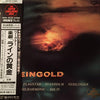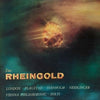



Wagner – Das Rheingold - Georg Solti and the Vienna Philharmonic (3LP, Japanese edition)
Richard Wagner – Das Rheingold
Baritone Vocals [Donner] – Eberhard Wächter
Baritone Vocals [Wotan] – George London
Bass Vocals [Alberich] – Gustav Neidlinger
Bass Vocals [Fafner] – Kurt Böhme
Bass Vocals [Fasolt] – Walter Kreppel
Mezzo-soprano Vocals [Erda] – Jean Madeira
Soprano Vocals [Fricka] – Kirsten Flagstad
Tenor Vocals [Froh] – Waldemar Kmentt
Tenor Vocals [Loge] – Set Svanholm
Tenor Vocals [Mime] – Paul Kuen
Vocals [Flosshilde] – Ira Malaniuk
Vocals [Freia] – Claire Watson
Vocals [Wellgunde] – Hetta Plumacher
Vocals [Woglinde] – Oda Balsborg
Orchestra – Vienna Philharmonic
Conductor – Georg Solti [click here to see more vinyl featuring Georg Solti]
3 LPs, Box set
Original analog Master tape : YES
Heavy Press : 180g
Record color : black
Speed : 33 RPM
Size : 12'’
Stereo
Studio
Record Press : unspecified
Label : London Records
Original label : Decca
Recorded September & October 1958 at September & October 1958
Produced by John Culshaw
Photography by Hans Wild
Originally released in 1959
Tracks :
Side A:
Side B: SCENE II
- Wotan! Gemahl! Erwache!
- Sanft schloß Schlaf dein Aug'
- Zu mir, Freia!
- Endlich, Loge!
Side C:
Side D: SCENE III (continued)
Side E : SCENE IV
- Gezahlt hab'ich: nun laßt mich ziehn!
- Bin ich nun frei?
- Fasolt und Fafner nahen von fern
- Gepflanzt sind die Pfähle nach Pfandes Maß
- Weiche, Wotan, weiche!
Side F: SCENE IV (continued)
- Geheimnis-hehr
- Hört, ihr Riesen!
- Schwüles Gedünst schwebt in der Luft
- Abendlich strahlt der Sonne Auge
- Rheingold! Rheingold!
Review:
“A few conductors have perhaps equalled Georg Solti in their conducting of Richard Wagner's baton-breaking Der Ring des Nibelungen—Karl Böhm, Daniel Barenboim, Herbert Keilberth, and Reginald Goodall have all had coherent visions of the work which they were able to translate effectively to disc. But no one has ever equalled what Solti, producer John Culshaw, and what looks increasingly like a hitherto unsuspected golden age of Wagner singers, together accomplished: what is still the recording art's crowning achievement. No one has bettered Solti's London/Decca Ring in terms of sweep, scope, grandeur, dramatic immediacy, and sheer adrenalin. His Ring was the first in stereo and the first recorded in the studio. Four decades after its first notes were laid down on tape, it also remains Solti's greatest accomplishment.
(…) The orchestration is appropriately heavy and thick, the score weighted toward timpani and the lowest ranges of the trombones, contrabass trombone, bass tuba, and double basses. The brass are now warmer, more true, but most pronounced are the differences in the lower midrange.
(…) James Lock has done an outstanding job of re-remastering one of the greatest recordings of all time. I applaud his sensitivity and restraint.” Richard Lehnert, Sterophile, November, 2012
Ratings :
Discogs :

